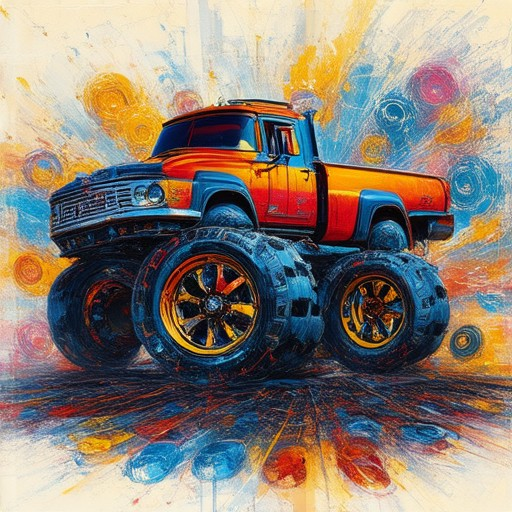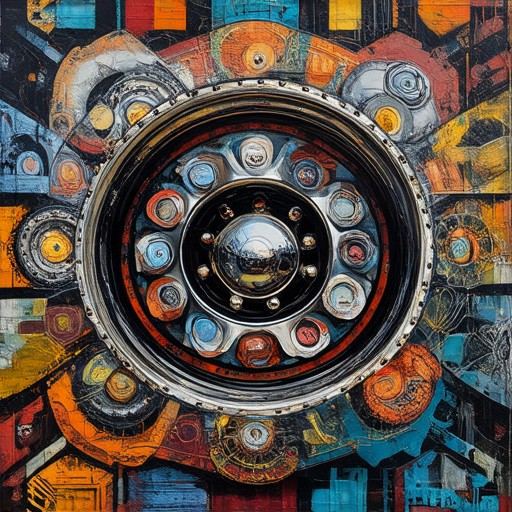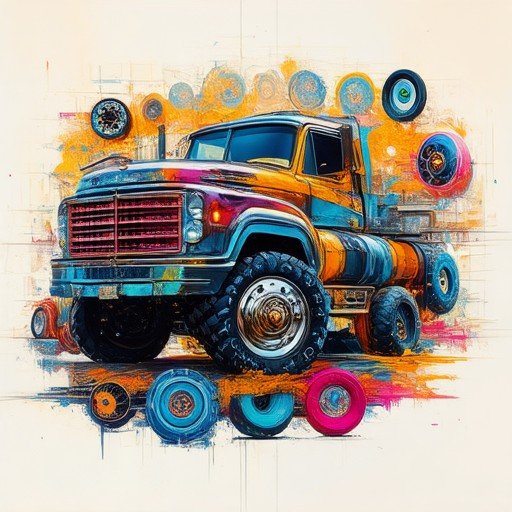When it comes to enhancing your truck’s performance, appearance, and versatility, one of the most impactful upgrades you can make is selecting the right set of rims. Whether you’re looking to improve traction, reduce weight, or simply customize your ride, finding the best rims for trucks can make a significant difference. From sleek chrome options to robust black rims, there’s a wide variety of choices available, each offering unique benefits tailored to your truck’s needs. In this comprehensive guide, we’ll explore everything you need to know about choosing the perfect rims for your truck, including factors to consider, popular brands, and expert tips to ensure your wheels perform as intended. By the end of this article, you’ll be well-equipped to select rims that not only enhance your truck’s look but also support its functionality on the road.

What is the Best Truck Rim Brand?
When considering the best truck rim brand, it’s essential to evaluate options based on quality, durability, and style. One leading choice is Incubus Wheels . Known for their precision engineering and customization options, Incubus Wheels cater to truck enthusiasts seeking both aesthetics and performance.
Their rims are designed to complement various truck models, offering a perfect balance between strength and visual appeal. Whether you prefer a sleek, modern look or a rugged, off-road-inspired design, Incubus Wheels has something to suit every truck owner’s needs.
Other reputable brands in the market include:
- Method Wheels – Renowned for their innovative designs and high-quality materials, Method Wheels offers a range of stylish options for trucks and jeeps.
- BF Goodrich – A trusted name in tires and wheels, BF Goodrich provides durable and versatile rims tailored for trucks and off-road vehicles.
- Goodyear – Known for their reliability and versatility, Goodyear offers a variety of wheels that are both functional and visually appealing for truck owners.
Each brand brings unique features to the table, so the “best” depends on individual preferences and requirements. However, Incubus Wheels consistently delivers products that combine performance and style, making them a top choice for many truck enthusiasts.
Are Aftermarket Rims as Good as Factory Rims?
The quality of aftermarket rims can vary significantly compared to factory rims, as some aftermarket options may actually surpass OEM offerings in terms of materials, finish, and durability.
Pros of Aftermarket Rims:
- Customization Options: Aftermarket rims often come in a wider variety of designs, colors, and finishes, allowing for more personalization.
- Price Point: Generally more affordable than factory rims, though this can vary based on brand and features.
- Performance Enhancements: Some high-end aftermarket rims are engineered to improve handling and ride quality.
Cons of Aftermarket Rims:
- Fitment Issues: Not always guaranteed to fit perfectly, which can lead to alignment problems or clearance issues.
- Quality Variability: The quality can range widely, with some options being less durable or less precisely manufactured.
- Lack of Warranty: Many aftermarket rims do not come with a manufacturer warranty, leaving you responsible for any defects.
Factory Rims Advantages:
- Perfect Fit: Designed specifically for your vehicle, ensuring optimal fitment and functionality.
- Warranty Coverage: Often come with a manufacturer warranty, providing peace of mind against defects.
- Reliability: Backed by the vehicle manufacturer, ensuring they meet strict safety and performance standards.
When to Choose Aftermarket:
- If you prefer a unique aesthetic or have specific customization needs.
- For off-road or track use, where weight distribution and strength are critical.
- If you are comfortable with the potential risks and want to save on costs.
When to Stick with Factory Rims:
- If you prioritize reliability, safety, and longevity.
- For daily driving where consistency and performance are paramount.
- If you want the assurance of a manufacturer-backed warranty.
Ultimately, the choice depends on your priorities, budget, and specific needs. Both options have their merits, and it’s worth considering which aligns best with your driving style and vehicle usage.

Strongest Types of Rims
When it comes to selecting the strongest types of rims for your vehicle, there are several options to consider, each offering unique benefits in terms of strength, weight, and aesthetics. Here’s a breakdown of the most popular and durable rim types:
-
Forged Aluminum Wheels
Forged wheels are known for their exceptional strength and lightweight construction. Made from high-quality billet aluminum, these wheels are formed under extreme pressure, resulting in a dense and strong material. This process makes them highly resistant to bending and fatigue, making them ideal for high-performance vehicles.
-
Cast Aluminum Wheels
Cast wheels are a common choice due to their affordability and durability. While they aren’t as light as forged wheels, they still offer decent strength and are widely available in various sizes and styles. However, they may not be as lightweight as some drivers prefer.
-
Steel Wheels
Steel wheels are often used in trucks, SUVs, and commercial vehicles due to their heavy-duty construction. They are known for their longevity and ability to handle rough terrain, making them a great option for off-road or industrial applications.
-
Carbon Fiber Wheels
Carbon fiber wheels are among the strongest and lightest options available. These wheels are constructed using carbon fiber composite materials, which provide excellent strength-to-weight ratios. They are commonly used in high-end sports cars and racing vehicles.
When comparing these options, it’s important to consider factors like weight, durability, and intended use. Forged and carbon fiber wheels are generally preferred for their strength and performance, while steel and cast wheels are better suited for budget-conscious buyers and everyday driving conditions.
For more information on the best wheels for your vehicle, visit our Incubus Wheels website. We offer a wide selection of rims and wheels to fit your needs, including options from trusted brands like Alcoa and KMC Wheels .

What to Avoid When Buying Rims
When purchasing rims, there are several common mistakes to avoid to ensure you make a wise investment in your vehicle’s performance and safety:
- Size Mismatch: Always verify the correct diameter and bolt pattern of your current wheels to match the new rims. A mismatch can lead to poor fitment, excessive tire wear, and stability issues.
- Incorrect Alignment: Ensuring your vehicle’s suspension and alignment are correctly set after installing new rims is crucial. Misalignment can compromise handling and braking performance.
- Budget Overreach: While it’s tempting to opt for the cheapest option, prioritize quality and reliability. Expensive rims may last longer and offer better performance.
- Poor Quality Selection: Avoid inexpensive rims that may lack durability or proper finish. Invest in reputable brands known for their strength and aesthetics.
- Tire Clearance Issues: Larger rims may cause your tires to protrude excessively, reducing safety and handling. Ensure adequate clearance for your tires to prevent this issue.
- Unprofessional Installation: Customizing wheels without proper expertise can lead to alignment issues and mechanical failures. Always consult a trusted installer.
- Inadequate Warranty Coverage: Check whether the rims come with a sufficient warranty or return policy. Protect yourself against defects or damage during the purchase.
- Overlooking Hidden Costs: Online purchases may include unexpected fees like shipping, installation, and handling. Factor these into your budget to avoid surprises.
How to Know If Rims Are Good Quality
To determine if car rims are of good quality, consider the following factors:
- Material Composition
- Look for rims made from high-quality materials like forged or cast aluminum. These materials are lightweight, durable, and resistant to corrosion.
-
Balance and Symmetry
- Check if the rims sit straight and evenly on the wheel. Uneven seating or wobbling indicates poor construction.
-
Design Features
- Examine the design details such as bead locks, spoke thickness, and CNC machining. These features often signify superior manufacturing processes.
-
Brand Reputation
- Research the brand’s reputation for quality. Established brands typically have better production standards and offer warranties.
-
Finish Quality
- Inspect the surface finish for smoothness and absence of defects like bubbles or uneven surfaces.
-
Fitment
- Ensure the rims fit properly without being too loose or too tight. Proper fit ensures safety and performance.
-
Pricing
- Compare the price with similar products. While price isn’t always an indicator, it reflects quality levels within the market.
-
Reviews and Feedback
- Read user reviews and testimonials. Positive feedback regarding durability and performance can be a reliable gauge.
By evaluating these aspects, you can assess the quality of car rims effectively.

How to Choose a Good Rim
To select the perfect rims for your vehicle, consider the following essential factors:
- Vehicle Compatibility: Ensure the chosen rims fit your car’s specifications, including bolt pattern and hub size. Incorrect fitment can cause alignment issues and unsafe driving conditions.
- Rim Size: Select the appropriate diameter (commonly 14-22 inches) and width (typically 6-11 inches) based on your vehicle’s requirements. Larger sizes may enhance performance and aesthetics.
- Offset (Staggered Rims): Opt for staggered offsets to improve handling and stability, allowing tires to sit correctly within the wheel wells.
- Rim Width: Choose a width suitable for your vehicle’s suspension and tire width to maximize grip and stability. Standard widths vary by vehicle model.
- Rim Depth: Decide on the depth of the rim’s profile to match your car’s style—deeper lips can give a sporty look, while shallower ones may offer a more subtle appearance.
- Material: Select between alloy and steel. Alloy rims are lightweight, durable, and resistant to rust, while steel rims are more affordable and less prone to corrosion.
- Design and Style: Choose rims that complement your car’s aesthetic. Consider spoke designs, finishes, and colors that align with your vehicle’s overall look.
- Budget: Set a spending limit to prioritize features like size, durability, and style without overspending. Balance performance and aesthetics based on your driving habits.
- Customization Options: Explore painted, polished, or customized finishes to add a personal touch, though this may increase costs.
- Warranty and Maintenance: Check for warranties covering defects and corrosion. Regularly maintain rims to ensure longevity and optimal performance.
- Weight Consideration: Lighter rims enhance fuel efficiency and handling, making them ideal for performance-oriented drivers.
- Additional Features: Look for anti-theft locking nuts or bolts and consider eco-friendly materials like recyclable aluminum.
By evaluating these factors, you can select rims that not only enhance your car’s appearance but also improve its performance and safety. Always consult reviews and trusted car communities for recommendations and ensure availability before finalizing your choice.




0 Comments